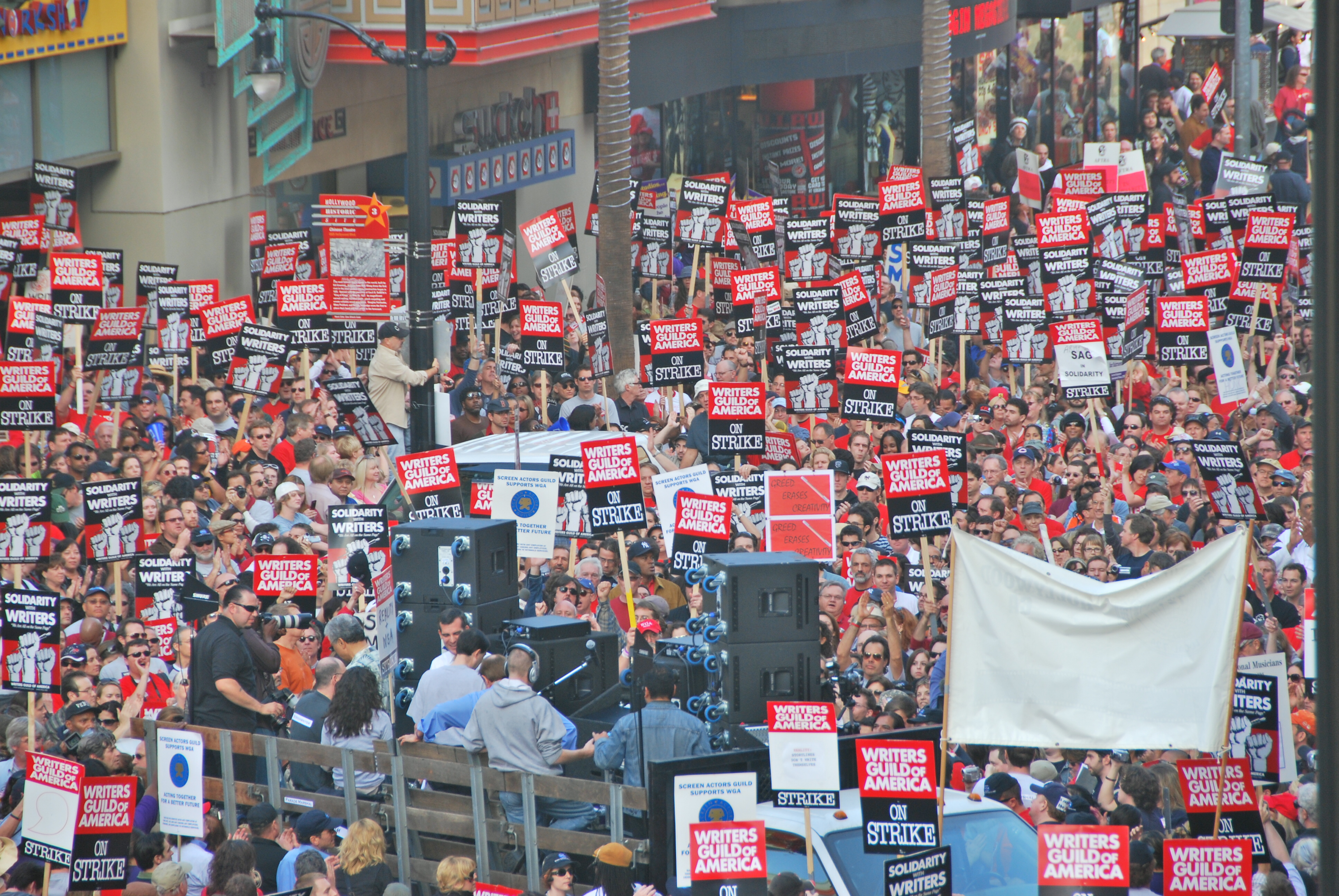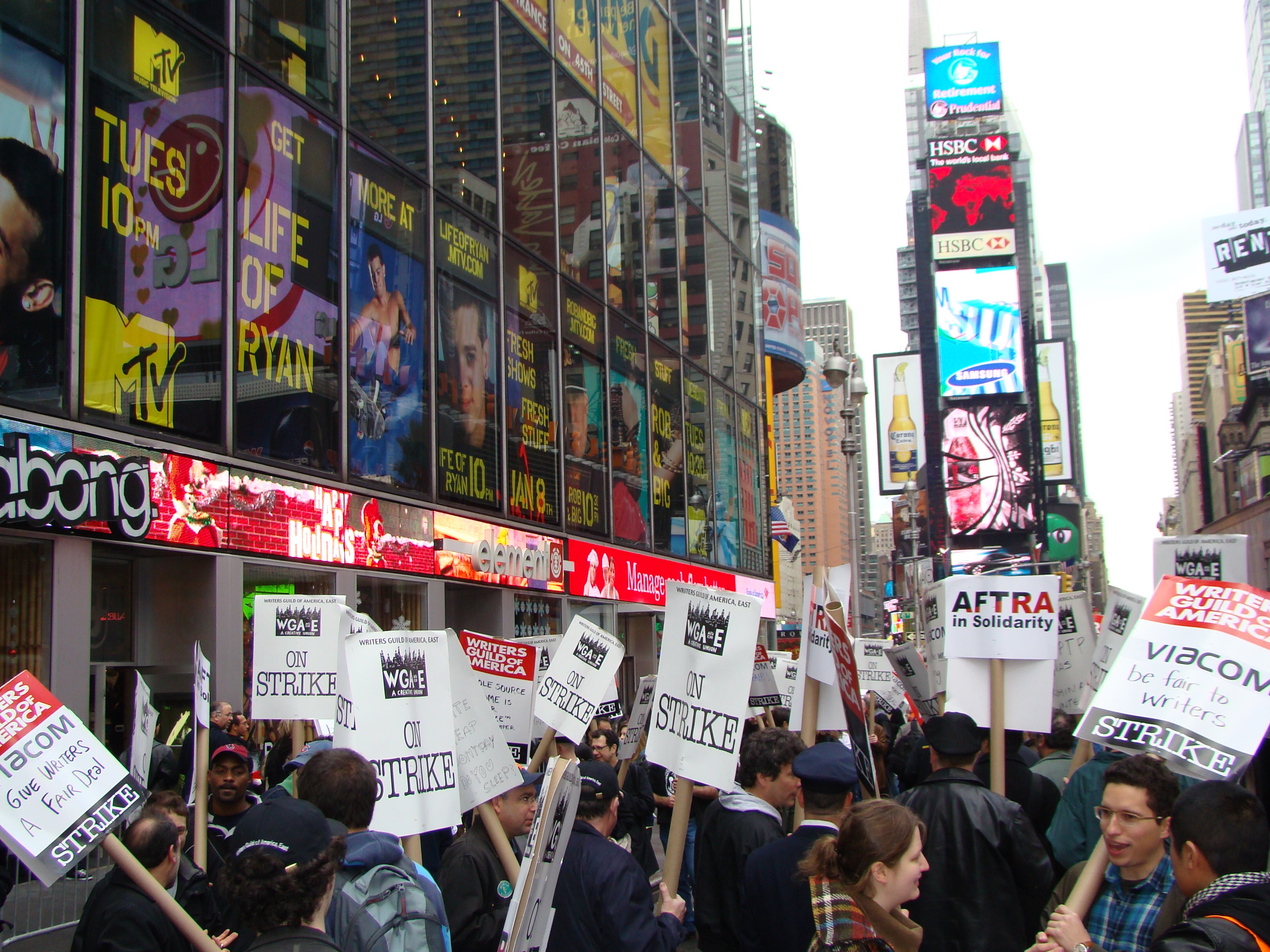 Writers, actors, crew members, and others rally on November 20, 2007 on Hollywood Boulevard to support the WGA in their contract battle with the AMPTP.
Writers, actors, crew members, and others rally on November 20, 2007 on Hollywood Boulevard to support the WGA in their contract battle with the AMPTP.Labor actions are as much about securing a brighter, more prosperous future for later generations of members as they are about affecting short-term change. The WGA’s 100-day strike from November of 2007 to February of 2008 was no exception. The industry was evolving, with new media developing at a breakneck pace and content moving to new platforms. Thanks to the foresight of its leadership and the determination, sacrifice and solidarity of its members, the WGA made sure that writers were not left behind, while simultaneously paving a way forward for the rest of the industry regarding new media.
In 2006, the announcement that Apple would be making movies available for download on its iTunes store set off alarm bells throughout the industry and within the WGA ranks. The knowledge that content was becoming increasingly available to consumers on the internet signaled, as then WGAW President Patric M. Verrone noted, “that the industry was about to change in a fundamental way.” It was apparent that the WGA had to address terms for this market because with every previous technological advancement—from cable to home video—the studios insisted they would never be able to make money, concluding that they would have to start paying writers less. Or, in certain cases, not paying writers at all. The WGA had already begun to get reports of established writers who were being asked to write small episodes for mobile phones for free.
In my opinion, nothing is as important as the issues surrounding digital delivery of content. Nothing. In the not-so-distant future, literally every piece of work ever done by the Guild will be available digitally. The systems and methods of delivery will vary and change, but the central truth is that all our work is going to be converted to ones and zeroes and sent to the consumer. We have to have a very clear, very solid method of tracking and being compensated for any and all work that is delivered in this way, whether it was originally created for TV or film or directly for digital distribution. To me, it is a strike issue.
Despite their pattern of catastrophic predictions, the studios have successfully monetized every major modern technological advancement to not only stay afloat but thrive. Along the way, they made vague promises that key players like writers would get their fair share at some point. If history has taught nothing else, it has shown that with each new technological advancement within the industry, the real risk is that writers, and other talent, will not receive equitable compensation for the reuse of their work. Not surprisingly, with content flooding the internet and after decades of broken promises that writers would be given a fair share of new and developing markets, the AMPTP was preparing to return to its usual playbook.
“We had to do something,” said Verrone. “The whole, ‘Fool me once, shame on you’ adage? Forget fool me twice, this was fool me the fourth time. We weren’t going to be fooled in 2007.”
And the WGA wasn’t. Facing a shifting, ever-evolving landscape, the WGA structured its 2007 negotiations around three core goals:
- Jurisdiction over original “new media” production as it was then called,
- Good residuals for the reuse of traditional TV and film product on the internet
- Access to new media contracts as well as language requiring fair market value for related party transactions.
After three months of negotiations and with the two sides far apart on issues of jurisdiction and new media, talks broke down in October, triggering a 90.3% strike authorization vote, followed by the walkout on November 5. Over the course of the next 100 days, more than 12,000 members joined together in solidarity, protesting, blogging, and walking picket lines coast to coast, often alongside fellow workers from different branches of the industry, who joined their WGA siblings in unity.
What Was Won in 2008
Ultimately, the WGA prevailed in all three of its key areas starting with jurisdiction over all made for new media programs.
Key Contract Terms Before and After the Strike
| November 4 AMPTP Offer | February 9 Final Deal | |
|---|---|---|
| Internet ad-supported streaming – in the first year of the life of a television program | Free for 6 weeks; 1.2% of producer’s gross thereafter (equal to 0.24% of distributor’s gross) | Free for 17 or 24 days; 3% of applicable minimum; switches for network prime time in the third year of the contract to 2% of distributor’s gross |
| Internet ad-supported streaming – after the first year of the life of a program | 1.2% of producer’s gross | 2.0% of distributor’s gross |
| Internet ad-supported streaming feature films | No residual offered = zero | 1.2% of distributor's gross |
| Internet ad-supported streaming feature films | No residual offered = zero | 1.2% of distributor's gross |
| Electronic Sell-Through (Download to Own) | DVD rates (0.3% and 0.36% of distributor’s gross) | 0.65% and 0.7% of distributor’s gross |
| Internet Download Rentals | 1.2% of distributor’s gross | 1.2% of distributor’s gross |
| Fair Market Value test | Fair Market Value test | Enhanced test for related-party transactions |
| Inspection of New Media Deals and Activity reports | None | Rights for quarterly inspections of unredacted company records |
| Promotional use in new media | Free, however they define it, including ad-supported streaming of complete programs | Clips only are free and only with clearly promotional purpose |
| Made-for-New-Media | Jurisdiction over dramatic forms only if derived from MBA-covered scripted programs; excludes original, comedy-variety, serials, etc. | Jurisdiction over all New Media programs; terms and conditions applied to all but the lowest-budgeted productions, only when done by non-professional writers |
| Creator’s rights (“Separated” Rights) | None | TV Separated Rights adapted to New Media |
 WGA members picket outside Viacom’s headquarters in Times Square, New York City during the 2007-'08 strike.
WGA members picket outside Viacom’s headquarters in Times Square, New York City during the 2007-'08 strike.As a result, going forward, companies producing original material for the internet must provide coverage for WGA members and non-members who are working on projects meeting a modest budget requirement. The streaming market was still in its infancy in 2008, but that picture would soon change. By 2021, nearly half of television employment was for series on streaming services. Foresight paid off.
In the ensuing years, writers have continued to build on the foundation established in the 2008 MBA, setting minimums for high-budget subscription and increased residuals for those programs, the first foreign new media residual, and increased residuals for the streaming of television shows on ad-supported video on demand (AVOD).
In 2008, writers also earned significant gains in residuals for internet ad-supported streaming both in TV and streaming feature films and DVD rates. And the WGA won the right to inspect new media deals that companies were making including distribution statements and usage data.
The trade headlines branded the 2007-'08 WGA strike “100 Days that Changed Hollywood.” While the costs and sacrifices were substantial, this strike proved to be an industry game-changer. By winning jurisdiction over new media, the WGA set a precedent on which the entire industry could negotiate moving forward.